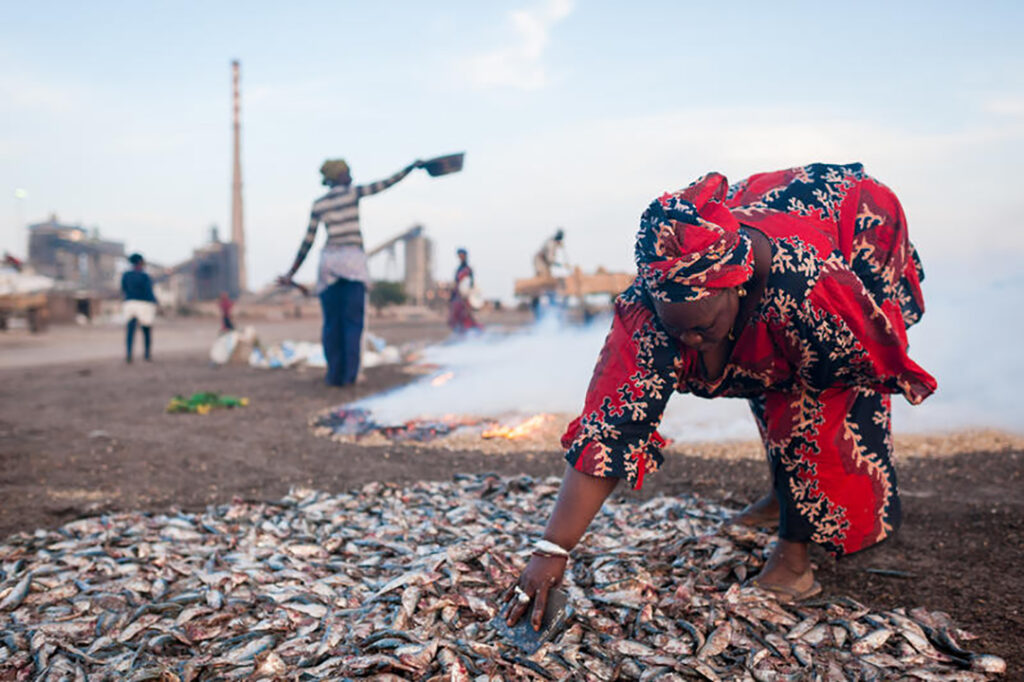ADF STAFF
People who depend on fish for food and income in Senegal are speaking out against Chinese-owned fishmeal and fish oil factories that have operated there for years.
Fishmeal factories pulverize fish into powder to feed to farmed seafood, such as shrimp, as well as pigs, chickens and other animals. China is the world’s top importer of fishmeal and one of the world’s top shrimp exporters.
The factories pose a dire food security threat because they usually are supplied by large foreign trawlers that catch tons of fish a day — far more than artisanal canoes — sometimes illegally. According to the United Nations, 90% of Senegal’s fisheries already are fully fished or facing collapse.
“In Senegal we used to have two or three factories that used to process just the fish trimmings, but in the last decade they began constructing new factories. There are about nine factories built, but due to pressure from communities and [nongovernmental organizations] only three or four remain operational today,” Dr. Ibrahima Cissé, Greenpeace Africa’s oceans campaign manager in Dakar, Senegal, told ADF in an email. “These factories aren’t supposed to use fresh fish, but to be profitable, these factories simply cannot rely only on trimmings.”
In Senegal, fish accounts for about 70% of the animal protein consumed, according to a 2019 Greenpeace report.
“It’s very hard to replace fish protein because it represents the cheap animal protein, and government programs to fight malnutrition are always imperfect,” Cissé said. “The best solution is simply to allow people access to fish instead of using the stocks of fish for processing and turning them into pet food or livestock feed in another corner of the world.”
Conservationists and artisanal fishing associations say the factories also are destroying ecosystems, devastating the environment and crippling tourism.
Fatou Samba, a fish processor at a site near Dakar, is among the country’s fishing industry workers who are calling on the government to shut down the factories. Senegal’s fishing sector employed more than 600,000 people in 2019; many fish processing jobs in the region are held by women.
Before the factories opened, fishermen sold fish to be converted into fishmeal to local markets. Now, local fish processors are unable to compete with the prices paid by fishmeal factories for a case of fish, meaning “we have less access to the fish,” Samba told Greenpeace.
“This is a disaster for the population because we need fish, we need to work, and so do all the others who are relying on the activities in the ports, processing sites and local markets,” she said. “The state must force the fishmeal and fish oil factories not to buy fish for processing for industrial aquaculture, livestock and poultry feed. This fish is needed by those who live in Senegal and the West African region as a source of food and livelihoods.”
In the northwestern town of Gandiol, residents have demanded that officials shut down Sea Production, a Chinese fishmeal factory, claiming that air in the rural area has been unbreathable since the factory opened in 2016, according to Afrik21, which reports on African environmental matters.
“Since the factory started its activities, the education of children has been threatened in our village,” teacher Ndatté Diallo told Afrik21. “Our students have the right to learn in a healthy environment. We therefore call on the state and we ask for the complete closure of this plant.”
Abdoulaye Ndiaye, manager of Greenpeace Senegal’s ocean campaigns, added that the factory’s pollution “also has a negative impact on the living environment of the area’s populations and on their activities, from fishing to agriculture and livestock farming.”
Locals have called for the government to stop licensing foreign trawlers, known for their illegal, unreported and unregulated (IUU) fishing in prohibited areas. China is the world’s worst IUU fishing offender, according to an index developed by Poseidon Aquatic Resource Management and the Global Initiative Against Transnational Organized Crime.
Last year, Senegal’s Fishing Ministry publicly rejected the applications of 52 trawlers, but pressafrik.com, an online newspaper based in Dakar, reported that the government had issued licenses to three fishing vessels in China’s Fu Yuan Yu fleet. Ships in the fleet were chased off by Djibouti’s Coast Guard in 2017 after local fishermen protested their presence.

